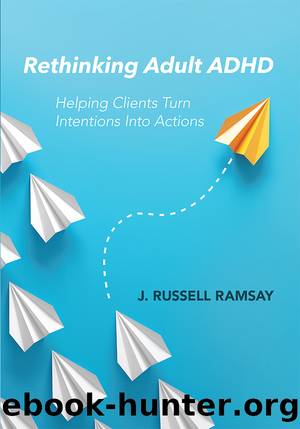Rethinking Adult ADHD by J. Russell Ramsay

Author:J. Russell Ramsay [Ramsay, J. Russell]
Language: eng
Format: epub
Publisher: American Psychological Association
Escape Behaviors
Finally, a therapist can ask a client, âWhat are the behaviors that will signal that you are procrastinating?â or, using a poker term, âWhat are your tells for procrastination?â Clients often cite behaviors such as texting, checking social media, and excessive time on websites as common time thieves.
Although escape behaviors may fall into the category of procrastivity, there are copious examples of nonproductive escape tasks (e.g., playing a game on a phone or tablet, watching television, otherwise wasting time earmarked for a priority task). These actions are often justified by statements like âI deserve a break,â âLet me relax and then Iʼll be in the mood for the task,â and countless others. Mitch said that he is at risk for âgoing down the rabbit holeâ of news websites during study time. His resolution was to put his laptop and smartphone on airplane mode until at least 4:30 p.m., his planned end-time.
Tagging escape behaviors ahead of time helps clients to catch or avoid them and stay on task. In fact, it is useful to differentiate between good and bad breaks, as some bad ones (e.g., checking the news) run the risk of undoing the plan, whereas good, bounded ones (e.g., get a cup of coffee) are more likely to keep the person on track. Task planning also addresses risks by way of stimulus control, such as when Mitch chose to study at the library rather than among the distractions in his dorm room and put his gadgets in airplane mode.
In fact, behaviors that are escapes in the middle of a task (a bad break) can be used as incentives for completion (e.g., âAt 4:30 p.m., I will catch up on the newsâ); although, after successfully completing a task goal, most adults with ADHD describe being less likely to engage in them. This sort of this-then-that coping skill is a manifestation of Premackʼs principle, the use of a more highly desired activity to promote follow-through on a less desired one. This principle is an empirically based staple of behaviorism that is familiar to any parent making computer use contingent on a child completing homework. Predicting justifications for escape and developing task-promoting thoughts is an effective use of cognitive interventions.
Download
This site does not store any files on its server. We only index and link to content provided by other sites. Please contact the content providers to delete copyright contents if any and email us, we'll remove relevant links or contents immediately.
| Administration & Medicine Economics | Allied Health Professions |
| Basic Sciences | Dentistry |
| History | Medical Informatics |
| Medicine | Nursing |
| Pharmacology | Psychology |
| Research | Veterinary Medicine |
Periodization Training for Sports by Tudor Bompa(8272)
Why We Sleep: Unlocking the Power of Sleep and Dreams by Matthew Walker(6725)
Paper Towns by Green John(5191)
The Immortal Life of Henrietta Lacks by Rebecca Skloot(4588)
The Sports Rules Book by Human Kinetics(4386)
Dynamic Alignment Through Imagery by Eric Franklin(4217)
ACSM's Complete Guide to Fitness & Health by ACSM(4060)
Kaplan MCAT Organic Chemistry Review: Created for MCAT 2015 (Kaplan Test Prep) by Kaplan(4012)
Livewired by David Eagleman(3772)
Introduction to Kinesiology by Shirl J. Hoffman(3769)
The Death of the Heart by Elizabeth Bowen(3621)
The River of Consciousness by Oliver Sacks(3604)
Alchemy and Alchemists by C. J. S. Thompson(3521)
Bad Pharma by Ben Goldacre(3427)
Descartes' Error by Antonio Damasio(3279)
The Emperor of All Maladies: A Biography of Cancer by Siddhartha Mukherjee(3163)
The Gene: An Intimate History by Siddhartha Mukherjee(3098)
The Fate of Rome: Climate, Disease, and the End of an Empire (The Princeton History of the Ancient World) by Kyle Harper(3067)
Kaplan MCAT Behavioral Sciences Review: Created for MCAT 2015 (Kaplan Test Prep) by Kaplan(2986)
